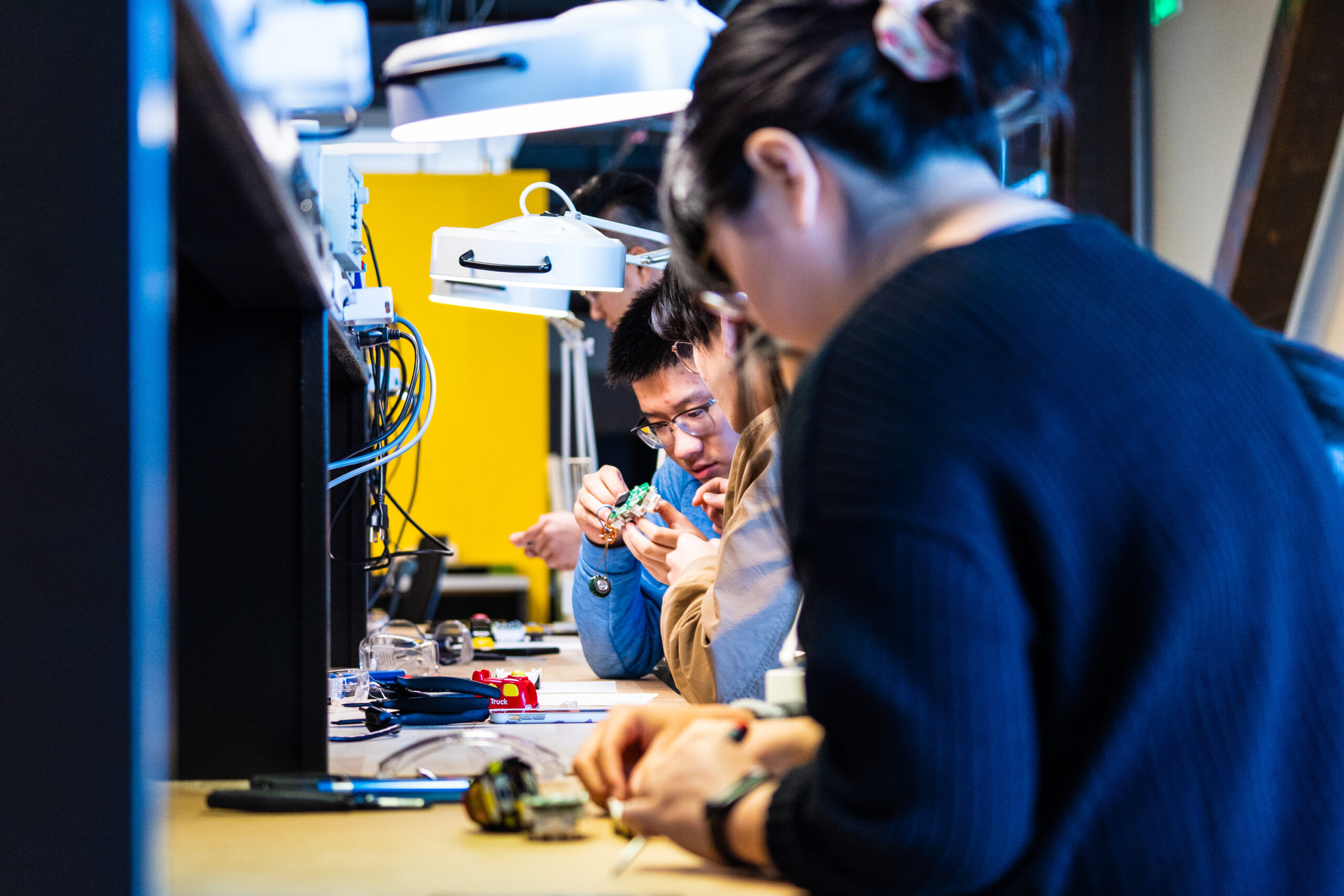
Mastering the Science, Art, and Business of Technology Innovation
UW’s Global Innovation Exchange fuses engineering, business, and design
In today’s economy, those who grasp the power and promise of advanced technologies have a distinct advantage over those who do not. Yet leaders who are equally skilled in the business and art of technology innovation will likely have an even greater impact on the world. The UW’s Global Innovation Exchange (GIX) was created to cultivate just such leaders.
Redefining technology leadership
Launched in 2017 with generous support from Microsoft, GIX is now jointly integrated with UW’s College of Engineering and Foster School of Business. Housed in UW’s Steve Ballmer Building, a 100,000-square-foot, purpose-built innovation center on Seattle’s Eastside in Bellevue, GIX provides students the tools and training they need to design future technologies, develop prototypes, and create sustainable pathways for business success.
“GIX offers interdisciplinary, project-based learning that blends engineering, business, and design,” says GIX Executive Director and CEO Sean Carr, an affiliate associate professor at Foster. “This is where students learn the skills to innovate and develop technology solutions. At the same time, we teach them how to understand users’ needs and bring ideas to market. Rarely does all this happen in one program, which makes GIX programs incredibly exciting learning environments.”
GIX’s approach to innovation
Central to GIX’s approach to innovation is its heavy emphasis on interdisciplinary, experiential, project-based learning. A walk through GIX’s learning spaces, which include professional-grade prototyping labs, maker spaces, and studios, it’s apparent that mastering innovation here is neither theoretical nor academic.
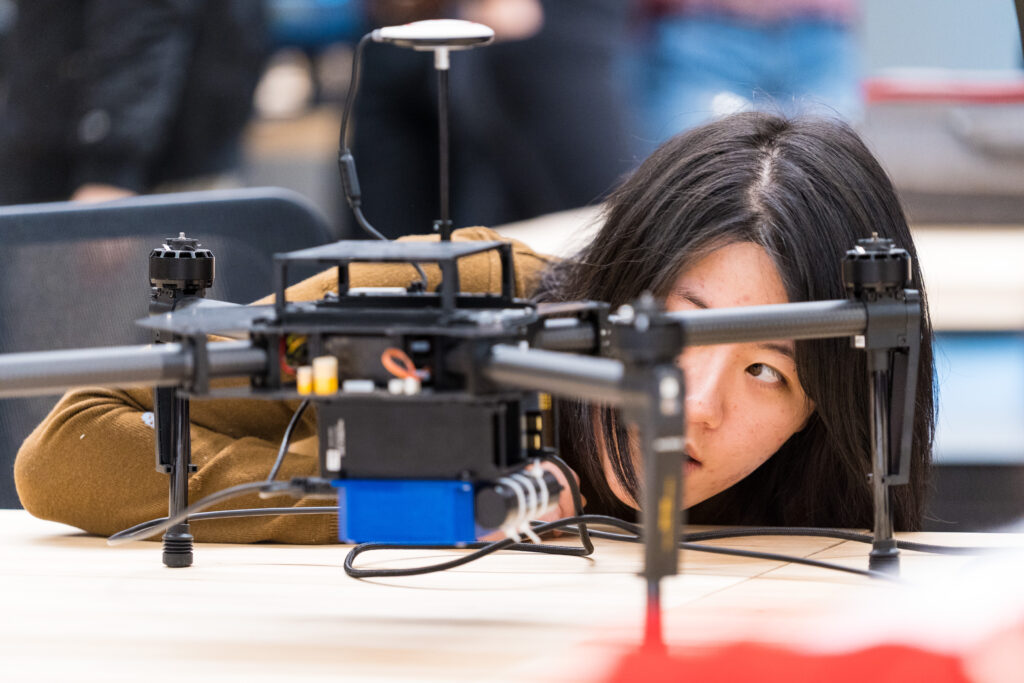
“One of my favorite moments is when, at every table in the lab, four or five students are working on projects, and there is a buzz in the room,” says Linda Wagner, GIX’s Senior Academic Director and Associate Teaching Professor in Human-Centered Design & Engineering. “Students are building things, sharing ideas, and helping each other. That’s GIX at its best.”
The project-based approach provides several benefits. Students simultaneously gain experience in product development, design, and teamwork. Sponsoring companies can leverage innovative concepts for future developments. Looking ahead, students gain industry contacts and have examples of their skill sets to showcase to future employers.
Employers are increasingly seeking multifaceted talent, innovative thinkers who are as fluent in technological development and design as they are skilled in business analytics and marketing.
“GIX is clearly at the forefront of advanced degree education,” says Dean of Engineering Nancy Allbritton. “Employers are increasingly seeking multifaceted talent, innovative thinkers who are as fluent in technological development and design as they are skilled in business analytics and marketing. GIX is tailored to train this new generation of cross-functional professionals.”
Mastering technology innovation
GIX’s flagship graduate degree is the Master of Science in Technology Innovation (MSTI), a full-time, in-person, 18-month program taught by faculty from the College of Engineering, Foster, the School of Law, and seasoned experts from Seattle’s business and tech sector. Since its inception, it has grown steadily each year, drawing students from a wide variety of undergraduate majors, professional backgrounds and experiences.
During year one, students are immersed in GIX’s classrooms and labs, where they learn the fundamentals of technology innovation, including software design, hardware development, design thinking, entrepreneurship and technology strategy. In the second year, they complete capstone projects with a sponsor and solve real-world business challenges. Project sponsors span tech, start-ups, non-profits and public agencies.
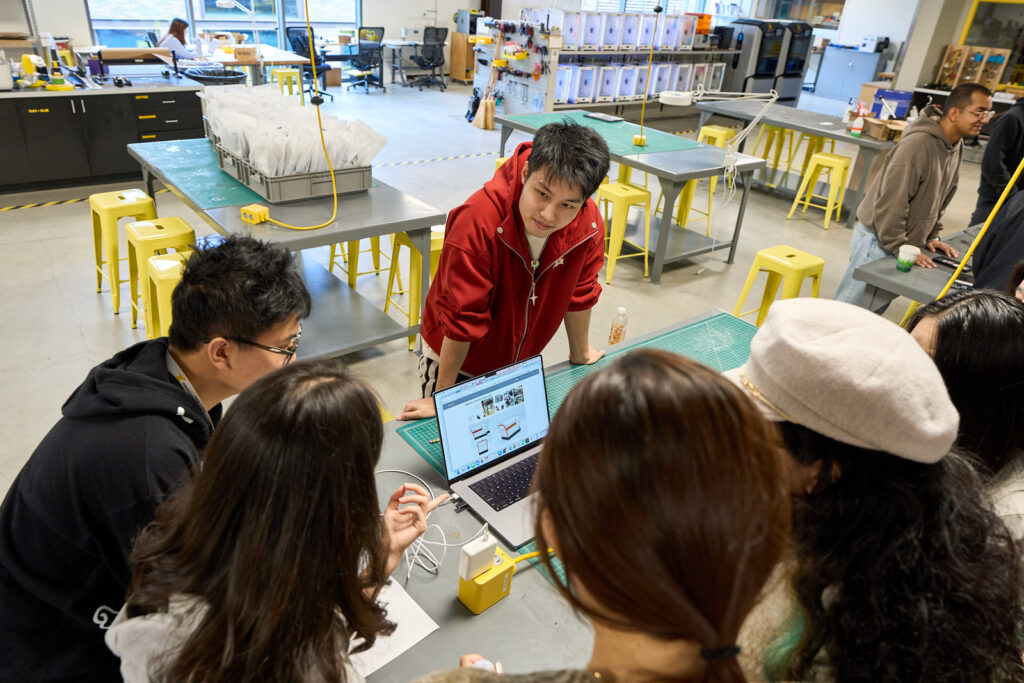
Capstone projects require students to develop and build new products utilizing technology to generate solutions that meet a business or societal need. Examples have included drones to help farmers evaluate the health of crops, sensors to measure the fuel efficiency of jet airliners, and hardware-software tools that enable public agencies to better monitor wildfire risks.
GIX excels at interdisciplinary learning, the type of learning that is needed to tackle today’s real-world, unstructured problems. Such problems do not fit neatly into disciplinary silos.
“GIX excels at interdisciplinary learning, the type of learning that is needed to tackle today’s real-world, unstructured problems. Such problems do not fit neatly into disciplinary silos. They require leading scholars to come together across disciplines to work in a cohesive partnership,” says Foster Dean Frank Hodge. “GIX is that partnership, and by bringing a leading business school together with a leading engineering school, the GIX partnership places us at the vanguard of new learning models in technology innovation.”
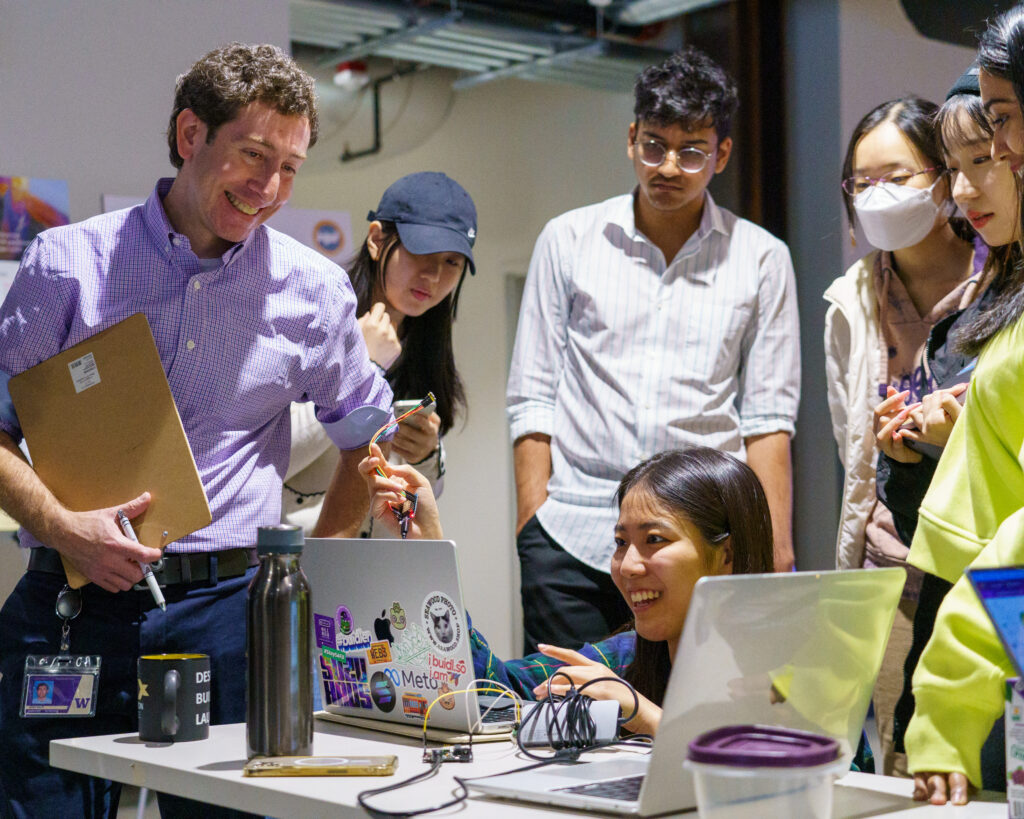
Innovating beyond borders
As reflected in its name, GIX transcends academic disciplines and geographic borders, offering students a global education and an international network. For instance, students may pursue a dual degree through GIX’s partnership with Tsinghua University. In thirty months, participants earn an MS in Technology Innovation in Seattle and an MS in Engineering in Beijing, enabling them to benefit from deep, cross-cultural exchanges.
For students seeking shorter but still robust international experiences, GIX offers two-week technology immersions, called Global Technology Experiences, in which they visit tech companies across the globe and meet with leaders at the forefront of innovation. Current destinations include Helsinki, where students focus on extended reality technologies and design, getting first-hand experience at the city’s renowned XR Center, and Tokyo, which focuses on human-robot interaction.
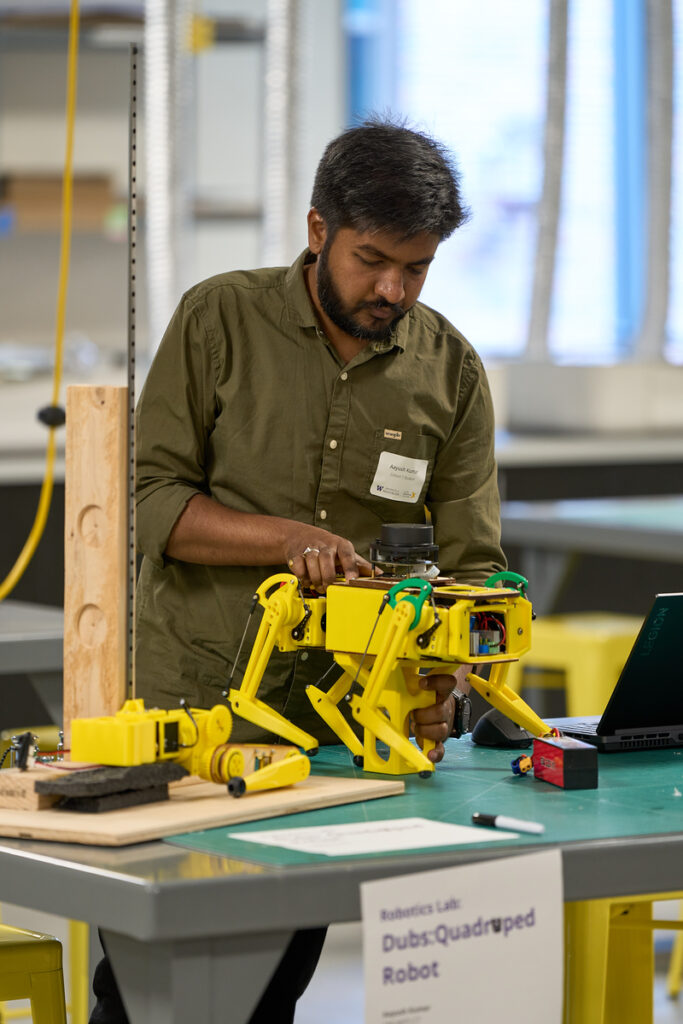
Notably, GIX has made these highly tailored programs available to all UW graduate students, further integrating GIX with the overall UW educational system.
Accelerating corporate innovation
The third pillar of GIX’s offerings is its professional development programs, where faculty from Engineering and Foster co-create learning experiences for corporate teams that focus on leveraging new technologies for competitive advantage. For example, GIX partnered with T-Mobile on a four-month program in which teams collaborated with UW faculty to conceive, develop, and prototype new products and services. GIX also offers a three-day seminar on generative artificial intelligence.
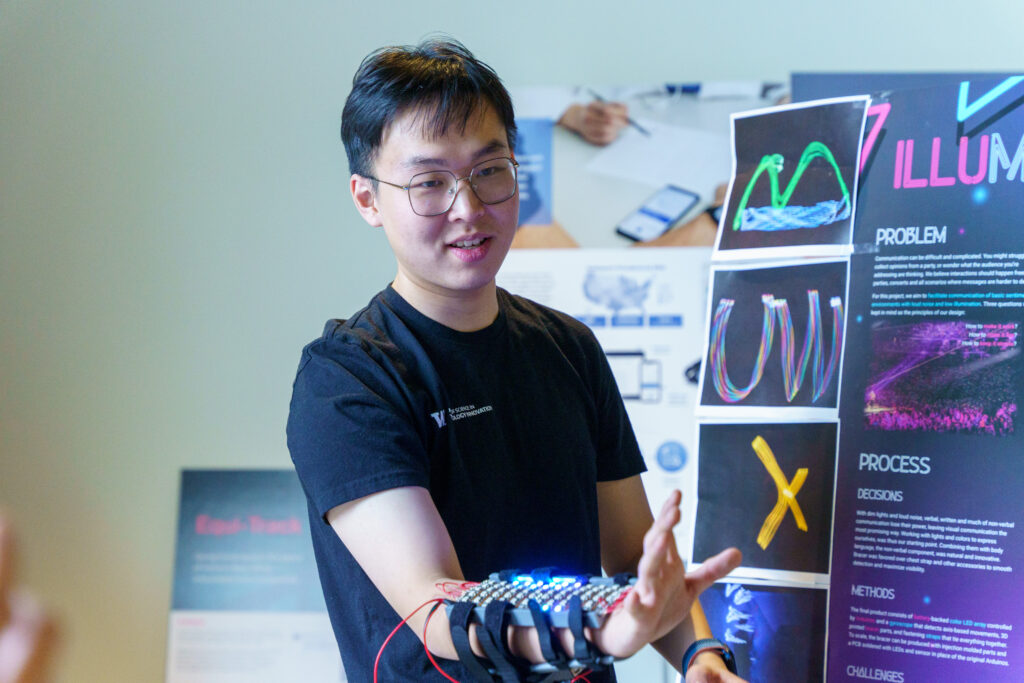
GIX’s close ties with major technology companies date back to its inception. In the years leading up to its launch, Microsoft’s President and Vice Chairman, Brad Smith, challenged the University of Washington.
“The question Smith raised was ‘How can we accelerate talent?’” explains Carr. “Too often, we operate within narrowly defined silos. We train people in silos. It’s tough to truly be interdisciplinary, yet the world needs people who can think in that way and weave strands of knowledge together to solve problems that matter.”
Fast forward to today and Smith’s and the University’s shared vision for GIX is a new entity within UW’s portfolio, developed with a global mindset and dedicated to interdisciplinary project-based learning that blends engineering, business, and design disciplines.
